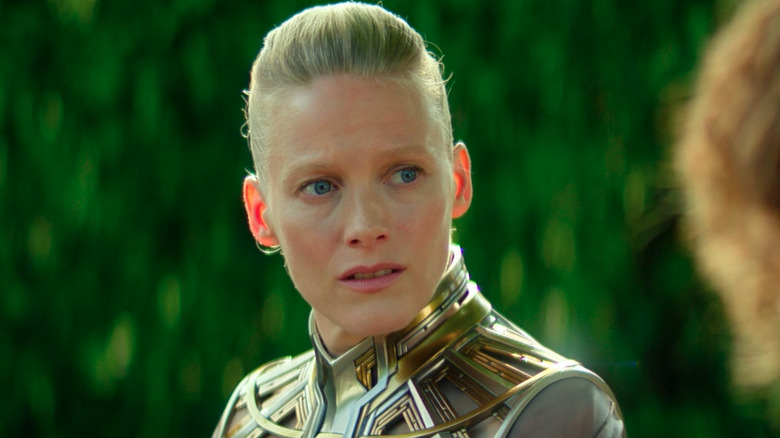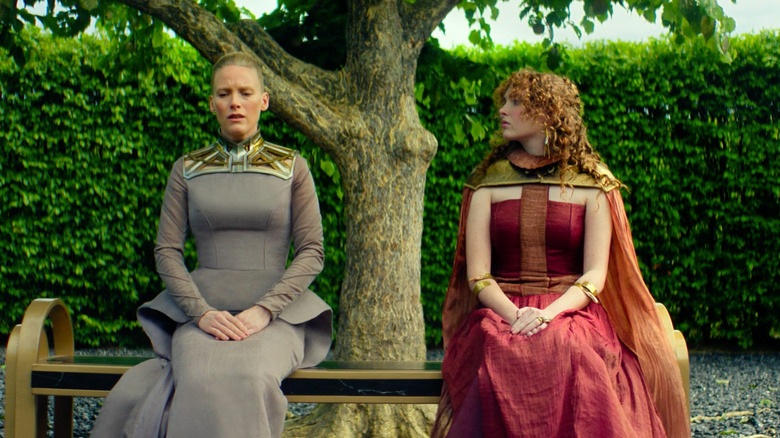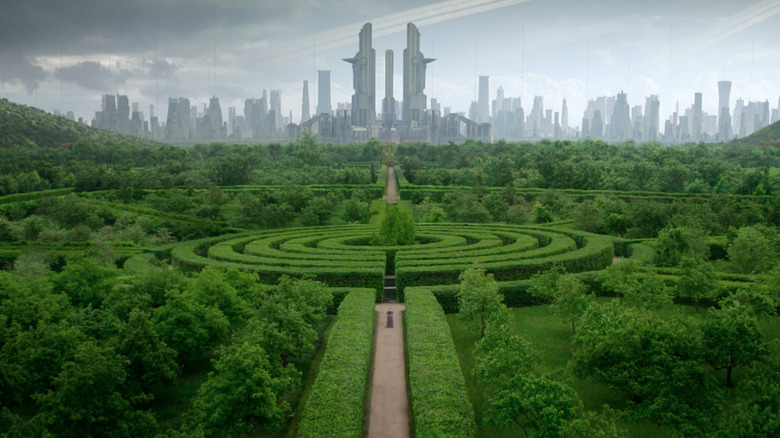Foundation Season 3: The Zeroth Law Explained
Contains spoilers for "Foundation" Season 3 (and beyond)
Season 3 of "Foundation" is off to the races. The Mule has arrived and all hell has broken loose on the Seldon Plan. While we saw the fledgling power of the telepathic mentalic at the end of Season 2, the Mule takes this power to all new levels, and it's easy to focus on his mental abuse and his overriding threat as the season kicks off. But back on Trantor, the automaton Demerzel (Laura Birn) is busy coming to her own conclusions — and these are synthetic determinations that center on a key development in Asimov's "Foundation" and "Robot" stories (which happen to share a universe).
We're talking about the Zeroth Law, a law that robots place above even the famous First Law of Robotics — you know, the one where "A robot may not injure a human being or, through inaction, allow a human being to come to harm." The Zeroth Law allows a robot to let humans come to harm (and in some cases even orchestrate that harm) if it is done in the name of the larger collective.
A little over halfway through the "Foundation" Season 3 premiere, Demerzel monologues with her sister in the gardens of Trantor. She reveals she isn't human. She's a positronic robot. She speaks of a war where robots were destroyed and their remains were buried in an orchard on Trantor. At one point, she's asked how robots even fought humans, since they're programmed with the Three Laws of Robots. The answer is the Zeroth Law.
What is the Zeroth Law?
We already covered the First Law of Robotics. The Second Law is obedience from robots to humans, and the third one is for robots to look out for their own safety — each law should only be followed if it doesn't conflict with the ones that precede it. In Asimov's universe, over time, robots manage to take these three laws and organically create a new programming called the Zeroth Law, which prioritizes humanity. In Demerzel's words, it is "A Zeroth Law that would prioritize humanity as a whole over the fate of any one human."
While this makes sense when presented in the show, it is actually a conclusion that Asimov worked toward across multiple books — not just in the "Foundation" series, but his "Robot" novels. The one where the Zeroth Law first comes up is called "Robots and Empire," and a good portion of the plot follows a pair of robots (R. Giskard Reventlov and R. Daneel Olivaw) who discover the new law and try to work it into their robotic processes with mixed success.
At one point in that book, Daneel saves Giskard instead of a human being next to him. When the latter asks why he broke the First Law, Daneel says, "You are more important than Madam Gladia is. [...] I am aware of your potential service to humanity, then, when I am confronted by a choice of action, Zeroth Law demands that I protect you ahead of anyone else." The chapters surrounding this interaction witness the birth of the Zeroth Law, nearly 20,000 years before the time we see it pop up in the show. The craziest part? Demerzel is Daneel from the novels, still guarding humanity 20,000 years in the future.
Is the Zeroth Law important in Foundation?
Okay, so the Zeroth Law is an interesting addendum to Asimov's Three Laws of Robotics. But what does it have to do with the larger "Foundation" plot? The answer: everything. Literally. That isn't an exaggeration. By the end of the seven-book "Foundation" series (which was almost adapted by Roland Emmerich, as the filmmaker exclusively told Looper), it's revealed that Demerzel is Daneel, and what's more, the robot has been quietly operating in the name of the Zeroth Law for 20,000 years.
Over that time, they've swapped out robot bodies and expanded their positronic mind to handle the massive capacity it takes to intake information for that length of time. They're also quietly guiding humanity as a whole, without anyone knowing it. Some of this influence is obvious to viewers of the show. Demerzel (who is portrayed as male in the books), is clearly pulling strings behind the Galactic throne throughout the early stages of the "Foundation" story.
But their influence goes further. As we'll see (if the show is able to run for a few more seasons), Demerzel is also a "parent" of sorts for the mentalic hive mind planet called Gaia. While it hasn't entered the show yet, suffice it to say that the people of Gaia are known as the Anti-Mules — and for a good reason. In the books, this entrance of the conscious collective of organic and inorganic matter into the story is the critical turning point for humanity as a whole — and Demerzel is at the center of that transition. The question is, how will it factor into the show?


